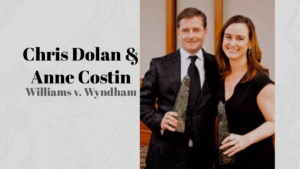
Amit writes: “Chris, I work for a tech firm that sells products to a federal agency under a contract requiring a 5 to 20% discount, depending on the product sold, off of the price the company charges private businesses for the same products. My company discounts its list prices if that is what it takes to make the sale to other businesses. This happens all the time. But the discount we give the government is based on solely on our list prices. This bothers me. What can I do about this?”
Amit, you are not alone. Over the past few years, many employees in the tech industry nationwide have stepped forward as whistleblowers because their companies defrauded federal agencies. Promising a federal agency a price discount compared to what private businesses are charged and then not providing the discount when charging for the item violates the False Claims Act.
The False Claims Act permits suits against government contractors if they knowingly present a “false or fraudulent claim for payment.” Individuals who uncover fraud in government contracts and programs can “blow the whistle” on the company by filing a lawsuit seeking recovery on the government’s behalf. While often current or former employees serve as whistleblowers, any person or entity that has evidence of a fraud occurring against the government may act as a whistleblower.
Violations of the False Claims Act can result in judgment in an amount equal to three times the amount of losses the government sustained, plus civil fines. As an incentive for stepping forward, the law allows whistleblowers to retain a percentage (usually 15 to 30 percent) of the damages awarded to the government.
Enacted in 1863, the False Claims Act “was originally aimed principally at stopping the massive frauds perpetrated by large contractors during the Civil War.” United States v. Bornstein, 423 U. S. 303, 309 (1976). At Congressional hearings, witnesses “painted a sordid picture of how the United States had been billed for nonexistent or worthless goods, charged exorbitant prices for goods delivered, and generally robbed in purchasing the necessities of war.” United States v. McNinch, 356 U. S. 595, 599 (1958). Note, California has its own False Claims Act to stop fraud against state agencies.
What happens if, in the situation you describe Amit, nothing was wrong with the products sold the government? That does not get the contractor off the hook. As the U.S. Supreme Court unanimously held last month in the Escobar case, a claim can be fraudulent not only if it clearly states something that is false, but also because it omits something important. The falsehood must be so serious that the government would have withheld payment.
The deliberate failure to include the discount in the invoices charged the federal agency gravely undermines the entire contractual relationship between the agency and your firm Amit. The agency would never had paid the invoice in full if it knew the prices stated for the itemized products did not incorporate the agreed upon discount.
Amit, I recognize the decision to report fraudulent activity by an employer is a difficult one. Whistleblowers provide an invaluable service to all Americans. They expose and end corporate wrongdoing that defrauds governmental agencies – and ultimately us, the taxpayers – of billions of dollars of revenue each year. Common types of whistlebower claims include:
• Fraudulent health care billing of Medicare or MediCal,
• Military or defense contractor fraud,
• Public works and construction contract fraud,
• Mortgage/loan fraud against Fannie Mae or Freddie Mac, and
• Tax fraud.
Even though the False Claims Act expressly forbids retaliation by employers, this is an obvious concern whistleblowers share. As a whistleblower, you are protected if you are the first to report new and unique information about fraudulent claims against the government. These claims must be presented in a specialized process, under seal, with copies sent to the U.S. Attorney.
Whistleblower law is complex, so it is important to work with an experienced attorney who handles False Claim Act cases to protect your interests.
By attorney Christopher B. Dolan, owner of the Dolan Law Firm. Email Chris questions and topics for future articles to help@dolanlawfirm.com









